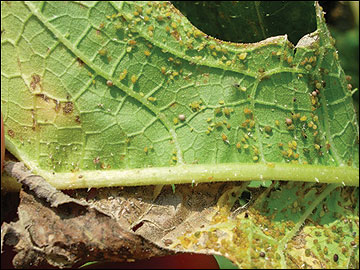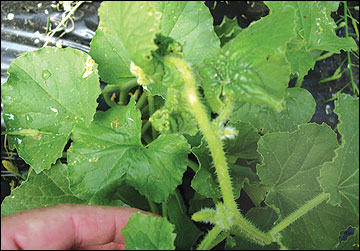Aphids
 Figure 17.
Figure 17.
Melon aphids congregate on lower leaf surfaces and cause 'cupping' of the leaves.

Aphids are small (1/10 inch long), pear-shaped insects with soft bodies. In the sheltered, humid environment of a high tunnel, aphids are prolific. The melon aphid (Aphis gossypii) is the most common aphid that feeds on cantaloupes and watermelons. Melon aphids are typically pale green in the wingless stage and dark black as winged adults (Figure 17). Aphids suck sap or photosynthates from the growing plant, causing it to weaken. Aphids also excrete tremendous volumes of waste material called honeydew, which becomes a black sooty mold on leaf and fruit surfaces. Aphids can transmit many serious cucurbit virus diseases.
Early detection of aphid invasion is crucial in a high tunnel. Scout rows closest to the baseboards or end walls for aphid infection. Generally, aphids can be found on the underside of leaves and at the growing tips of the vines. However, melon aphid can also be observed on lower leaves of the vines as well as the growing tips. Often the growing tips become curled, looking like virus symptoms. Melon aphids can overwinter within a high tunnel. Remove all crop debris from winter production, and destroy any weeds before establishing melons and watermelons in a high tunnel. Carefully inspect transplants to detect any aphids that may have invaded transplants in the greenhouse.
Aphids have many natural enemies, including ladybird beetles (Hippodamia convergens), lacewings (Chrysoperia rufilabis) and predatory midges (Aphidoletes aphidimyza). Natural enemies can be released to clean up hot spots in the high tunnel and should not be used as a rescue treatment when aphid numbers are high. Systemic, targeted insecticides (those that translocate within the plant) can be applied at transplanting to provide 30 to 36 days of aphid control. Consult the Midwest Vegetable Growers' Production Guide for the latest pesticide recommendations. Avoid using harsh, foliar insecticides that may kill beneficial insects in a high tunnel. There are several 'soft' insecticides that target only aphids and preserve beneficial insects. Always use a labeled surfactant with each pesticide to increase distribution over the foliage.